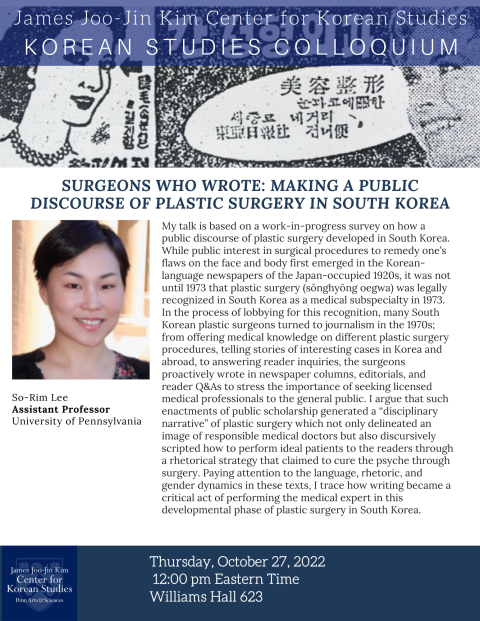
Korean Studies Colloquium
Williams Hall 623
My talk is based on a work-in-progress survey on how a public discourse of plastic surgery developed in South Korea. While public interest in surgical procedures to remedy one’s flaws on the face and body first emerged in the Korean-language newspapers of the Japan-occupied 1920s, it was not until 1973 that plastic surgery (sŏnghyŏng oegwa) was legally recognized in South Korea as a medical subspecialty in 1973. In the process of lobbying for this recognition, many South Korean plastic surgeons turned to journalism in the 1970s; from offering medical knowledge on different plastic surgery procedures, telling stories of interesting cases in Korea and abroad, to answering reader inquiries, the surgeons proactively wrote in newspaper columns, editorials, and reader Q&As to stress the importance of seeking licensed medical professionals to the general public. I argue that such enactments of public scholarship generated a “disciplinary narrative” of plastic surgery which not only delineated an image of responsible medical doctors but also discursively scripted how to perform ideal patients to the readers through a rhetorical strategy that claimed to cure the psyche through surgery. Paying attention to the language, rhetoric, and gender dynamics in these texts, I trace how writing became a critical act of performing the medical expert in this developmental phase of plastic surgery in South Korea.
So-Rim Lee is the Korea Foundation Assistant Professor of East Asian Languages and Civilizations at the University of Pennsylvania. So-Rim’s research and teaching explore the politics of representation in visual cultures and everyday embodiment in South Korea and the Korean diaspora from the intersection of performance studies, gender and sexuality studies, and cultural studies.
 James Joo-Jin Kim Center for Korean Studies
James Joo-Jin Kim Center for Korean Studies